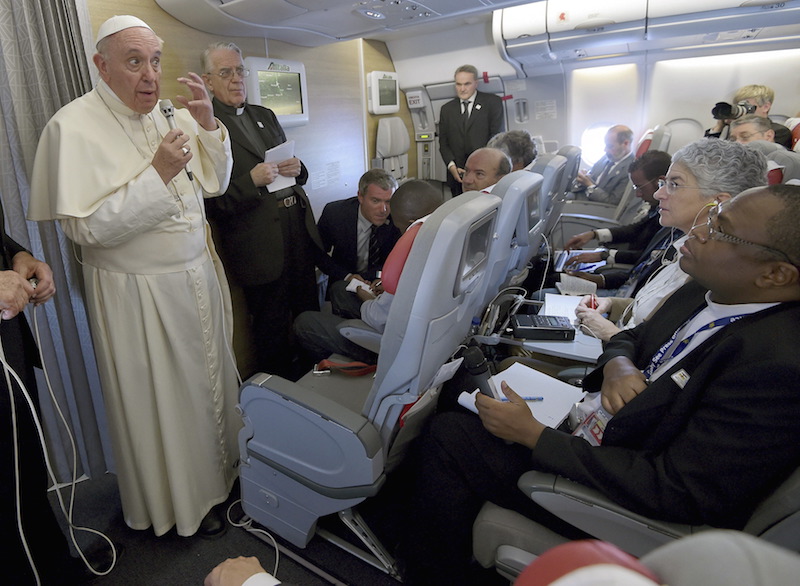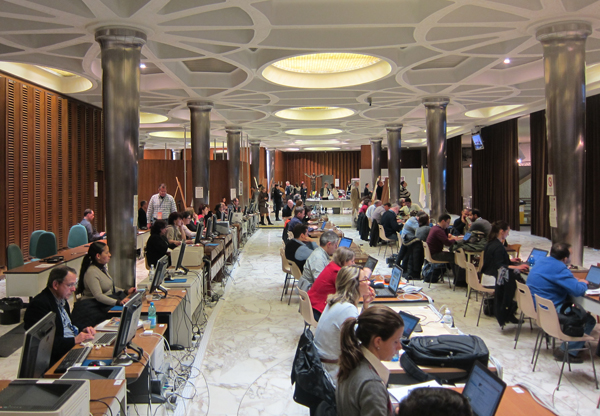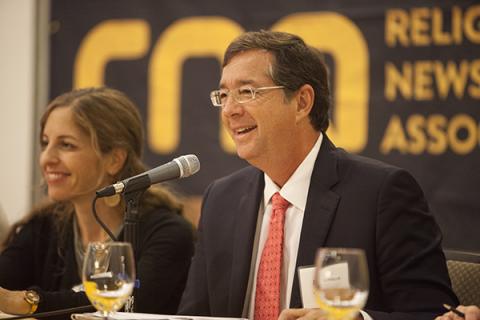
Pope Francis gestures during a meeting with the media onboard the papal plane while en route to Rome, Italy, November 30, 2015. (RNS/Reuters/Daniel Dal Zennaro/pool)
This week I am looking forward to the annual meeting of the Religion News Association (Sept. 7-9) in Nashville, where I hope to see old friends and make new ones. I enjoy the company of journalists, who are almost always bright, articulate and funny. Religion reporters are a special breed because of their interest in values, religion and the transcendent.
There is also some sadness as I get ready to travel because I know many old friends will not be there. It is not that they have died, although some have. Rather, there are simply fewer religion writers today. They have either been laid off or jumped ship before they got pushed out.
So, when we get to Nashville, I am not sure whether we will be singing country or the blues.
Professional journalism is in trouble because almost no one has figured out how to make money in the news business. The old newspaper model was based on subscriptions and advertising. There were times when a city would have six or more newspapers competing for readers.
Today, subscription revenue is down as fewer young people get their news from newspapers.
Ad revenue is also down. Classified ads have almost disappeared as people turn to Craigslist and other online ways to advertise. I remember when half the Sunday New York Times would be delivered on Saturday because the classified ad section was so thick.
Nor has television been good to journalists. Fox News learned how to make money by filling the air with controversy and commentary from talking heads without the backing of a deep bench of journalists. CNN was forced to follow Fox's lead when its viewership plummeted.
That leaves online news sites. But few news organizations have been able to be self-supporting through ads on the internet. And users have gotten used to getting information for free on the internet, so only a few sites, like The Wall Street Journal, The New York Times and The Washington Post, are able to get people to pay for their content.

The press room at the Vatican is full of journalists in the days before the announcement of the new pope. (RNS/David Gibson)
Declining revenues were followed by layoffs, and some of the first to go were religion reporters, not sportswriters. I have a list of religion reporters to whom I email my columns, and every week I get back a half-dozen "address unknown." After three or four such responses, I sadly delete them from my list.
Religious publications have always been nonprofit charities dependent on donations; secular news organizations are beginning to look like nonprofits. (RNS is a nonprofit.) Even The Washington Post had to be saved in 2013 by Amazon CEO Jeff Bezos, who bought the paper from the Graham family, which had owned it since 1933.
Advertisement

Jim Winkler, general secretary of the National Council of Churches, speaks to journalists during the 2014 Religion Newswriters Association conference in Decatur, Ga., on Sept. 19, 2014. (RNS/Sally Morrow)
Nor is journalism as much fun as it used to be in the old days. In the pre-internet age, a reporter would work on a story, meet his daily deadline and then head to the bar, where he would down a few while enjoying the company of his colleagues (yes, most journalists were male in those days).
And if you worked for a weekly, it was even better. When I covered my first Synod of Bishops in 1980, I had to only file one story a week. Since the bishops' meetings were closed to the press, I was able to spend hours and hours visiting almost every museum, church and ruin in Rome. It was the greatest assignment ever.
Today, journalists have to be ready 24/7 to write and post on their beat. Stories have to be updated quickly. Then there are blogs and social media. Twitter is a ravenous monster that must be followed and fed constantly. It turns reporters into self-promoting PR machines because they know that they are judged by how many followers they have and how many hits their stories get online. It is not surprising that older reporters frequently bail for a nine-to-five job in PR or elsewhere.
Why do the rest of us stay? We love it. Most reporters love their job. We are interested in what is going on, and we believe that our readers have the right to be informed. Some of us, yours truly included, enjoy having a soapbox to express our opinions to the world.
It is a great job. I just wish there were more of them.
When I get to Nashville, I will have my ears open to see which I hear more of, country or blues.
[Jesuit Fr. Thomas Reese is a columnist for Religion News Service and author of Inside the Vatican: The Politics and Organization of the Catholic Church.]
Editor's note: Sign up to receive free newsletters , and we will notify you when new columns by Fr. Reese are out.





